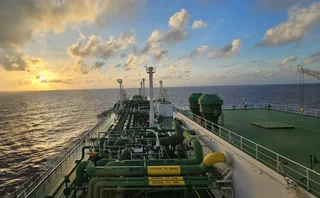Derivatives House of the Year, Asia – Deutsche Bank
Derivatives House of the Year, Asia – Deutsche Bank

Deutsche Bank wins Energy Risk's Derivatives House of the Year, Asia after proving the ability to grow its derivative product base, innovate new trading systems and greatly expand during a time of major change.
"We respond to the changing needs of our clients," says Gunnar Hoest, managing director and head of commodities for Asia at Deutsche Bank. "Before the credit crunch, consumers were demanding flow hedging in particular. However, since 2009, inventory financing is high on clients' agendas as they have become less worried about prices roofing in the near term and are more worried about their funding needs and how to manage inventories."
Deutsche Bank tackled the changing frontier for Asian energy and commodities derivatives by firstly expanding the team with key hires such as Hoest, Stuart Smith, head of corporate commodity sales for Asia, and David Silbert, global head of commodities. The bank, which has over 35 people in the energy and commodities derivatives team in Asia, expanded teams across the whole region and integrated members from all other asset classes to create specialist teams.
"The real lure of our commodity derivatives offering in Asia is the strength of the locally based teams across the whole of the region," says Silbert. "From Beijing to Singapore, Vietnam to Australia, our business allows us to access more customers, more markets and more liquidity than some of our competitors."
Smith adds: "Our head count accounts for a huge proportion of success with our clients. We integrate multi-disciplinary teams to create structured solutions for our clients. We take people from credit, foreign exchange, equity and pull them together to design and structure solutions for our commodities clients."
With specialist teams in place, Deutsche Bank has shown a range of significant achievements over this awards period. In 2009, the investment bank installed the capability to do physical transactions in some of Asia's most sought-after commodities, which means it is able to develop structured financing solutions involving physical commodities to assist clients' financing requirements.
"One of our key focuses is to stay ahead of the curve," says Hoest. "This means we look to anticipate what happens in the market in the future and structure new products that will fit into this scenario. We have already demonstrated this by our instrumental presence in new markets like iron ore, minor metals and coal."
Following this, Deutsche Bank saw a fourfold increase in business over the past six months.
"Given the growth in Asia, this requires a lot of product innovation," says Silbert. "There are new commodity products being developed in Asia as clients have been demanding more solutions. It is where the action is happening."
But 2009 wasn't just a breakout year for Deutsche Bank's derivatives product offerings, as the group managed to buoy up its commodity flow trading capabilities by constructing new online trading platforms. Last year it launched its liquid carbon platform, which allows clients to sell Certified Emissions Reductions (CERs) credits electronically in Asia. The new platform, which is a build out of its Autobahn model, has translated into a 14% year-on-year increase in its client base across all products.
Moving forward, Deutsche Bank is still looking to make the next couple of years just as significant as 2009.
"Coal, iron ore and freight all have similar clients, similar product offerings and similar risk," says Silbert. "We are looking to align these businesses into one unit and calling it a bulk trading business."
The bank is also looking to expand its e-trading capabilities by possibly putting on some selected energy products on the Autobahn platform within the next six months.
Click here to see the article in PDF format.
More on Risk management
Energy Risk reaction: Venezuela and oil sanctions
Energy Risk talks to Rob McLeod at Hartree Partners about the energy risk implications of the US’s control of Venezuelan oil
CRO interview: Shawnie McBride
NRG’s chief risk officer Shawnie McBride discusses the challenges of increasingly interconnected risks, fostering a risk culture and her most useful working habits
Increasingly interconnected risks require unified risk management
Operational risk is on the rise according to a Moody's survey, making unified risk management vital, say Sapna Amlani and Stephen Golliker
Energy Risk Europe Leaders’ Network: geopolitical risk
Energy Risk’s European Leaders’ Network had its first meeting in November to discuss the risks posed to energy firms by recent geopolitical developments
Energy Risk US Leaders’ Network: tackling volatility
Energy Risk’s inaugural US Leaders’ Network convened in Houston in October to discuss risk management challenges caused by geopolitical upheaval, policy uncertainty and volatility
LNG trading strategies set to change amid major market shifts
The global LNG market is on the brink of significant changes set to alter trading dynamics and market behaviour, say analysts
Why commodity finance is ripe for stablecoin
Digital currency brings cost efficiencies to financing, but its real benefit to commodity firms lies in making huge pools of new capital available, write Jean-Marc Bonnefous and Ronan Julien
US shutdown leaves commodity traders without key data
Commodity traders are ‘flying blind’ without Commitment of Traders reports







